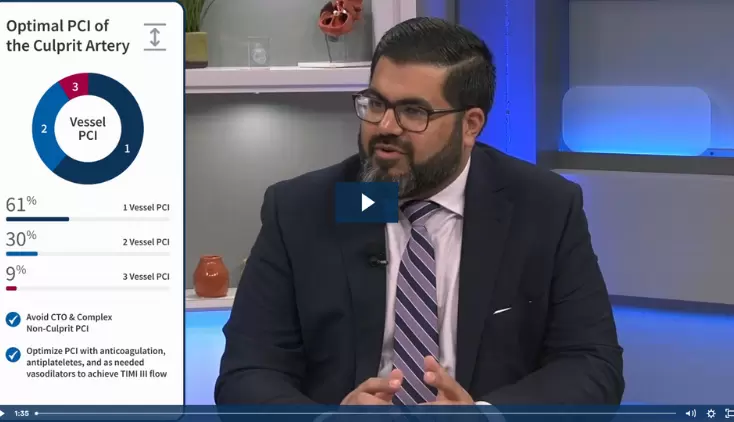Clinical Research & Data, Protected PCI
TCT 2022: Influential Trials in High-Risk PCI
“We’ve reached a very significant point in the evolution of PCI, and in particular, complex PCI,” states Jonathan Hill, MA, MBChB, FRCP, as he opens his presentation of influential high-risk PCI trials at TCT 2022. “We’ve got this convergence of technique and technology.”
Dr. Hill highlights the complexity of coronary disease treated on a daily basis and the need to be mindful of the spectrum of risk as it relates to the clinical evidence being generated. “We are now entering an era where we have an accumulation of data from the Impella series of studies—from PROTECT I, II, and III—and we’ve reached a really incredible point, where we now have the pivotal high-risk PCI trial to be done. This is going to get us towards the class Ia indication.”
Dr. Hill briefly highlights the data collected in the PROTECT series of studies. PROTECT II demonstrated that complete and optimal revascularization with Impella® heart pumps led to improved outcomes with a significant reduction in adverse cardiovascular events at 90 days. In PROTECT III, with the ever-rising complexity of the disease—longer lesions, severe calcification, higher number of vessels treated, left main interventions, and the use of atherectomy—Dr. Hill emphasizes, “What we saw in the PROTECT III study was with contemporary practices that there are improved outcomes.”
The recently published RESTORE EF study, Hill explains, demonstrated significant improvement in ejection fraction (EF) following contemporary high-risk PCI, with more pronounced improvement in patients with severe and moderately depressed EF. “So the message is emerging now that the more severe the LV dysfunction, the more there is to gain. And if you can enable complete revasc, that you will see these really very substantial gains in EF.”
Dr. Hill briefly discusses the limitations of the recently published REVIVED BCIS-2 study. “This was not a particularly sick population in comparison to PROTECT II and III and we’ll see with PROTECT IV that the target population is really very different. And there was minimal mechanical circulatory support—used only 3% of patients—so it’s really not the types of patients with predominant angina and heart failure symptoms that we are treating in our everyday practice.”
After a brief review of the PROTECT IV study design, Dr. Hill concludes, “So we’re at an extremely exciting point in the evolution of complex coronary disease treatment… all of this accumulated data and upcoming randomized controlled study with Impella-supported patients is aiming for a class I indication.”
NPS-3177


